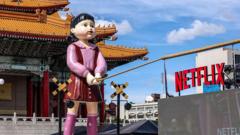"The finale of Netflix's 'Squid Game' has surfaced mixed feelings among South Korean viewers, who grapple with its themes of justice and societal inequalities, raising questions about the show's deeper cultural implications."
"The Cultural Impact of 'Squid Game': A Deep Dive into its Finale and Societal Reflections"

"The Cultural Impact of 'Squid Game': A Deep Dive into its Finale and Societal Reflections"
"As ‘Squid Game’ concludes, fans reflect on its portrayal of societal struggles in South Korea and the unsettling messages it leaves behind."
Fans of the Netflix phenomenon "Squid Game" gathered over the weekend to watch the highly anticipated season finale, marking the end of a journey that has spurred global discussions on societal issues. Premiering its final season on Friday, the series maintained its grip on audiences through heart-pounding twists and intricate character arcs. Despite its commercial success and critical acclaim, the last six episodes left many fans in South Korea desiring a sense of justice that they felt was absent.
Since its debut in 2021, "Squid Game" has captivated millions with its chilling take on survival games, where contestants risk their lives for a staggering cash prize of 45.6 billion won, approximately $33 million. However, as the curtain falls on Season 3, the fate of protagonist Gi-hun (played by Lee Jung-jae) has left a lingering sense of disappointment for many viewers, as he met his demise while nefarious forces prosper.
For fans like 24-year-old university student Kim Young Eun, the season's outcome sparked frustration rather than resolution. Watching the finale with her boyfriend at a local comic book café, she lamented the loss of beloved characters, arguing that the conclusion reflected a disheartening lesson that virtue often leads to ruin. "It felt like the director was delivering a message that good people finish last," Kim remarked.
This sentiment resonates across South Korea, where "Squid Game" has transcended mere entertainment to unveil stark truths about socioeconomic disparities and the sometimes cruel dynamics of competition. As the show's gripping narrative intertwines with real-world issues, viewers are left to ponder the implications of its storytelling and the cultural legacy it reinforces.























